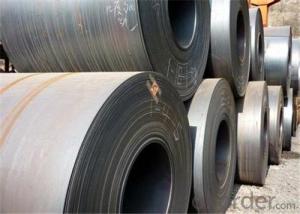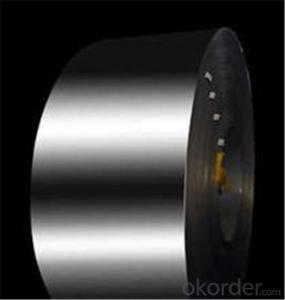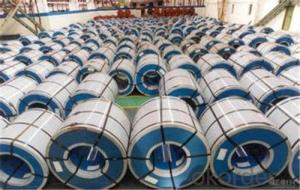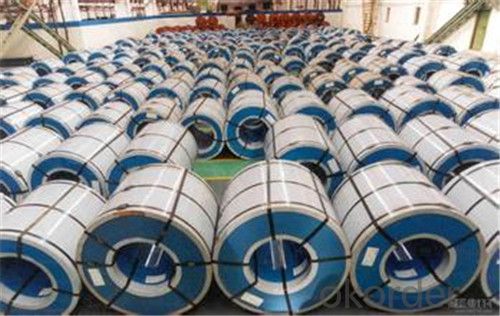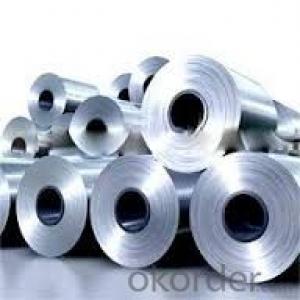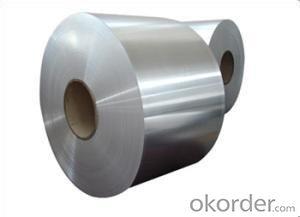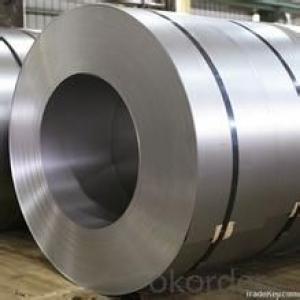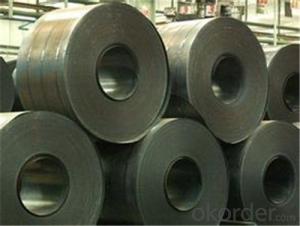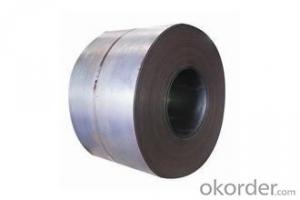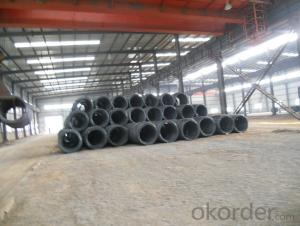Hot Rolled Steel Coil-SAE1006 in Good Quality in CNBM
- Loading Port:
- Shanghai
- Payment Terms:
- TT OR LC
- Min Order Qty:
- 50 m.t.
- Supply Capability:
- 500000 m.t./month
OKorder Service Pledge
OKorder Financial Service
You Might Also Like
Description:
Hot-Rolled Steel Sheets and Coils are applied to a wide range of uses such as automobile, electrical appliance, machinery manufacturing, container manufacturing, shipbuilding, bridge, pipeline, and receive high acclaim from our customers for its excellent quality.
Specification:
Product: | Hot Rolled Steel Coils/Sheets |
Material: | Q195,Q235,A36,SS400,S235JR,Q345,ST37-2, CCSB etc |
Standard : | JIS G3002 GB/T251B |
Technique: | hot rolled |
Thickness | 1.2mm to 200mm |
Tolerance of thickness: | :+/-0.03mm |
Width: | 750mm-2000mm |
Tolerance of width: | :+/-5.00mm (aiming to +/-2.00mm) |
Normal width: | 914mm, 1000mm, 1200mm, 1219mm, 1250mm,1500mm |
Length: | According to requirement |
Coil ID: | 508mm-610mm |
Coil Weight: | 10-25 Metric Tons |
Surface: | Black, Chromate, fingerprint resistant treatment, slight oiled or non-oiled, dry |
Port of Loading: | Tianjin/Shanghai port |
Packaging Details: | Standard export packing or according to the clients required |
Delivery Time | Within 30 days after received 30% deposit or workable L/C |
Payment Terms: | L/C,T/T |
Characteristic:
Our products enjoy an excellent reputation and have been exported to Europe, South-America, the Middle-East, Southeast-Asia, Africa and Russia etc.. We sincerely hope to establish good and long-term business relationship with your esteemed company.
Image:
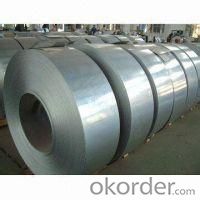
FAQ
1.What's your MOQ?
25MT, it is for one container.
2.Do you have QC teams?
Yeah, sure, our QC team is very important, they will keep the quality control for our products.
3. What's your normal delivery time?
Our delivery time about 10-20days for standard sizes, if you have other requirements like hardness and width ,it is about 20-40days. But don't worry ,we also try our best for the delivery time ,because time longer and our cost is higher.
- Q: I need to identify a metal. It is rusty so I suspect it is either iron or steel. Since they both have similar densities and are magnetic, how do I tell the difference betweeen steel and iron?
- Iron is a natural ore. Google: Iron ore, click on Mineral Information Institute - Iron Ore. Steel is a man-made material, consisting of iron. Google: Sir Henry Bessemer, inventor.
- Q: which pokemon has the most steel pokemon???
- Robopon ;) Transformers? really... fail joke, Robopon is essentially pokemon with robots ;) But on-topic, i believe Platinum would be your best choice.. from memory, it had no end of steel and steel-hybrids.
- Q: Are steel coils used in construction?
- Yes, steel coils are commonly used in construction. They are used for various applications such as structural framing, roofing, walls, and other components in buildings and infrastructure projects. Steel coils provide strength, durability, and flexibility, making them a popular choice in construction.
- Q: How are steel coils used in the manufacturing of construction cranes?
- Steel coils are used in the manufacturing of construction cranes to provide structural strength and durability. These coils are typically shaped and welded to form the main framework of the crane, which supports heavy loads and ensures stability during operation. Additionally, the steel coils are used to fabricate various components such as the boom, jib, and counterweights, which contribute to the crane's lifting capacity and overall functionality.
- Q: I have hundreds of pounds of scrap steel... who purchases this steel and what is the price per pound etc. of this? Does someone pick it up or do I bring it somewhere?
- It okorder /
- Q: How are steel coils used in the production of shipbuilding materials?
- Steel coils are used in shipbuilding materials as they provide a versatile and durable solution. They can be processed into various shapes and sizes, including plates, beams, and sections, which are essential components for constructing ships. The coils are often cut and shaped to fit specific design requirements, offering strength and structural integrity to the ship's framework. Additionally, the coils are utilized in the fabrication of various shipbuilding components, such as hulls, decks, bulkheads, and superstructures, ensuring the vessels' resilience and stability.
- Q: Project for school, we're learning about periodic elements and we have to choose an item from our hobbies to research what its made of. Any ideas on steel guitar strings??
- Steel is usually mainly made up of Iron (Fe) element, but it can also include Carbon (C) for a stronger steel or Nickel (Ni) for stainless steel.
- Q: I need to know the density of steel as one of my physical properties of steel. Any answers? If u have more physical or chemical properties of steel, that would help to thanks.
- This Site Might Help You. RE: What is the density of steel? I need to know the density of steel as one of my physical properties of steel. Any answers? If u have more physical or chemical properties of steel, that would help to thanks.
- Q: What are the factors that affect the quality of steel coils?
- The quality of steel coils can be influenced by various factors. To begin with, the composition of the steel itself plays a vital role in determining its quality. Impurities like sulfur or phosphorus can have a negative impact on the strength, durability, and overall performance of the steel. Additionally, the quality of the steel is affected by its carbon content, alloying elements, and heat treatment. Furthermore, the quality of the steel coils is greatly affected by the manufacturing process and techniques utilized during production. Factors such as the cleanliness of the production environment, the precision of the rolling and cooling processes, and the control of temperature and pressure throughout manufacturing all contribute to the final quality of the coils. Additionally, the surface quality of the steel coils is a crucial factor. Any defects or imperfections on the surface, such as scratches, dents, or corrosion, can compromise the integrity and functionality of the coils. It is essential to handle, store, and transport the coils properly to maintain their surface quality. Moreover, the mechanical properties of the steel coils, including tensile strength, yield strength, and elongation, are essential indicators of their quality. These properties depend on various factors, such as the type of steel, its thickness, and the processing conditions. Lastly, external factors such as environmental conditions, like humidity and temperature, can affect the quality of steel coils. Exposure to moisture or extreme temperatures can lead to corrosion or other forms of degradation, impacting the overall quality and lifespan of the coils. In conclusion, the quality of steel coils is influenced by several factors, encompassing the composition of the steel, the manufacturing process, surface quality, mechanical properties, and external environmental conditions. It is crucial to carefully control and monitor these factors to produce high-quality steel coils that meet the desired specifications and standards.
- Q: What are the common welding defects in steel coils?
- There are several common welding defects that can occur in steel coils during the welding process. These defects include: 1. Porosity: This is characterized by small holes or voids in the weld metal, which are caused by gas entrapment during the welding process. It can weaken the weld and make it more susceptible to corrosion. 2. Lack of fusion or incomplete penetration: This defect occurs when there is inadequate fusion between the base metal and the weld metal, or when the weld metal does not fully penetrate the joint. It can result in a weak or brittle weld. 3. Cracks: Cracks can occur in the weld metal or in the heat-affected zone (HAZ) of the base metal. They can be caused by factors such as high stress levels, improper cooling, or inadequate preheating. Cracks can significantly reduce the strength and integrity of the weld. 4. Undercutting: Undercutting is a groove or depression that forms at the toe of the weld due to excessive melting of the base metal. It weakens the weld and can lead to stress concentration and potential failure. 5. Excessive spatter: Spatter refers to the small droplets of molten metal that are expelled from the welding arc and can land on the surface of the steel coil. Excessive spatter can result in a rough or uneven surface finish and may require additional cleaning or grinding. To minimize these welding defects in steel coils, it is important to ensure proper weld preparation, including cleaning and removing any contaminants from the surface of the steel. Additionally, using the correct welding parameters, such as appropriate heat input and travel speed, can help to minimize defects. Regular inspection and quality control measures can also help to identify and address any defects before they become more serious issues.
Send your message to us
Hot Rolled Steel Coil-SAE1006 in Good Quality in CNBM
- Loading Port:
- Shanghai
- Payment Terms:
- TT OR LC
- Min Order Qty:
- 50 m.t.
- Supply Capability:
- 500000 m.t./month
OKorder Service Pledge
OKorder Financial Service
Similar products
Hot products
Hot Searches
Related keywords
